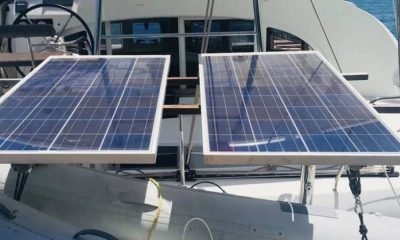Certification, Test Et Inspection
Tenaska developing 2,000 MW of solar in the Midwest market

Capital Dynamics, an independent global private asset management firm, announced that its Clean Energy Infrastructure (CEI) business has signed an agreement with respected energy developer Tenaska to develop a portfolio of greenfield solar projects in the Midwest. The deal closed on November 26, 2018.
The transaction includes 14 solar projects with approximately 2,000 MW in the Midcontinent Independent System Operator (MISO) market. The portfolio represents a large share of all solar projects currently in the MISO North interconnection queue, with projects in Michigan, Missouri, Illinois, Wisconsin, Indiana and Minnesota.
“This agreement was a unique opportunity for us to acquire a meaningful pipeline of solar capacity in an efficient project development structure within a market poised for growth,” said Benoit Allehaut, director of Capital Dynamics’ Clean Energy Infrastructure team. “Tenaska has historically been one of the most successful developers of electric generation and a close partner of Capital Dynamics on several existing projects. We are excited to be expanding our partnership and offer clean energy power through long-term supply contracts to customers in the Midwest.”
The agreement with Tenaska further diversifies Capital Dynamics’ growing solar portfolio. The company’s Clean Energy Infrastructure team is the second-largest owner of solar projects in the United States and manages approximately $4.9 billion in assets and 3.1 GW capacity in its current portfolio.
“Tenaska has a proven record of success in solar development, and we are excited to pair our development skills with Capital Dynamics’ capital origination and structuring capability,” said Steve Johnson, senior vice president in Tenaska’s Strategic Development & Acquisition Group. “This transaction further strengthens the existing relationship between our two companies.”
Tenaska, an independent power producer, has developed more than 10,000 MW of natural gas-fueled and renewables power projects, including two utility-scale solar projects in Southern California, in which Capital Dynamics is an investor. The Omaha, Nebraska-based company has a robust renewables program that includes advanced and mid-stage projects in the midwest, as well as a majority investment in Soltage, a distributed solar generation company based in New Jersey.
Capital Dynamics was advised by Amis, Patel & Brewer as legal counsel for this transaction.

Certification, Test Et Inspection
IEC / UL 61730 – The New Harmonized Standard for Safety

USA and International Access in One Standard
On December 4, 2017, the long-term effort to harmonize the UL1703 PV module safety standard was completed with the publication of UL 61730-1 and UL 61730-2.
A New UL Safety Standard
The new harmonized standard included the updates in IEC 61730, published August 2016, as the basis for harmonization with UL 1703 and resulted in UL 61730-1 and UL 61730-2. Advances in materials, increasing system voltages and innovative designs are addressed with new and updated construction and testing requirements. The new PV module standard further enables reduction in product cost, increases in performance and broadens access to markets with continued confidence in their safe operation.
While the publication of the harmonized standard does not immediately replace UL 1703, it is important to know how the changes will impact your current PV module or system design. Whether you’re a manufacturer, developer or financier of PV systems, you can benefit from the updates.
The UL 61730 consists of 2 parts:
Part 1: Describes the construction requirements for photovoltaic (PV) modules in order to provide safe electrical and mechanical operation during their expected lifetime. Key updates include:
- Clearly defined Insulation requirements based on material properties, material
- groups, location of installation and installation type
- Cemented joints concept for maintaining insulation requirements
- Overvoltage categories, system voltage classes and protective means
- Requirements for component approvals
Part 2: Provides the testing sequence intended to verify the safety of PV modules whose construction has been assessed by UL 61730 part 1.
- This edition of the standard contains over 20 significant technical changes relative to the previous edition
- A minimum of nine PV modules and one unframed PV module now required for the updated test sequences
Evaluation and testing of a PV module for certification involves both part 1 and part 2 of the new standard.
Harmonized standards enable accesses to global markets. Global commerce depends on the use of technically valid standards to facilitate international trade in products such as those in PV systems. The UL 61730 harmonized safety standard enables cost savings for manufactures by testing once and leveraging the UL “record of test” for access to other markets. Since regional regulations for installation of electrical products must be considered, additional requirements called national differences or deviations also apply and incremental testing may be necessary depending where the product is installed.
New construction and testing requirements aimed at innovation. Since publication in 1986 of the first PV standard, UL has been in lockstep with the evolution of PV module technology and understands the relationship between their operation in the field and testing in the lab.
Construction requirements in UL 61730-1 are specific to PV module materials, equipment application, accessibility and environmental factors; when applied correctly they reduce the likelihood of technical error in the design stage. Applying the concepts of insulation coordination and getting the spacing’s right increases confidence of a compliant result when testing for safety certification, reducing the cost of rework.
Testing requirements in UL 61730-2 reflect lessons learned from the field across a variety of technologies, materials, installation types and climates. Most notable is the B Sequence which does a more thorough job of weather testing of the modüle construction and is intended to simulate a stressor scenario for adhesion at multiple material interfaces. Also, the test method looks at weathering of the front side as well as the back side of the module.
ULs Continuing Certification program supports coexisting safety standards. Safety certification to UL1703 for existing products and the use of UL61730 for certification of new products provides the least disruptive path for the PV industry. The aim of the standards technical panel (STP) decision is to allow manufacturers to continue to apply the UL mark on established products to show safety compliance. New products or changes to existing products must comply with UL67130 by the transition date of December 4, 2019.
Why UL?
UL drives global research and standards to continually advance and meet ever-evolving product safety, performance and interoperability needs. We partner with businesses, manufacturers, trade associations and international regulatory authorities to bring solutions to a more complex global supply chain.
Knowledge & Experience – As a contributing member of the IEC TC2 Working Group 2, North America code making panels and convener of the International Harmonization Committee we have deep understanding of the new requirements in UL 61730-1 and 61730-2 for specific market applications.
Speed & Efficiency – Our globally located state-of-the-art labs and combined testing for UL 61730, IEC 61730 and IEC 61215-series reduce turnaround time.
Single Source Services – Combine your testing to IEC and UL standards to save you valuable time and money and expand market access.
-

 Solar Panels7 years ago
Solar Panels7 years agoAre Tesla solar roof tiles worth it?
-

 Genel7 years ago
Genel7 years agoMaldives luxury resort is powered entirely by solar panels
-

 Control Systems Et Software7 years ago
Control Systems Et Software7 years agoHOMER responds to the rapidly growing solar+storage market with Grid software
-

 Solar Technologies6 years ago
Solar Technologies6 years agoGOODWE PARTNERSHIP WITH GE
-

 Solar Technologies5 years ago
Solar Technologies5 years agoSolar panel covered Autobahn can break speed record for Germany’s energy transition
-

 Operation and Maintenance7 years ago
Operation and Maintenance7 years ago1000-Acre Sunflower Solar Farm to be Built for Entergy Mississippi
-

 Events6 years ago
Events6 years agoGREENoneTEC revolutionizes solar heating with Sunpad
-

 Large -Scale Solar Panels7 years ago
Large -Scale Solar Panels7 years agoABB to construct solar power expansion in Dubai






